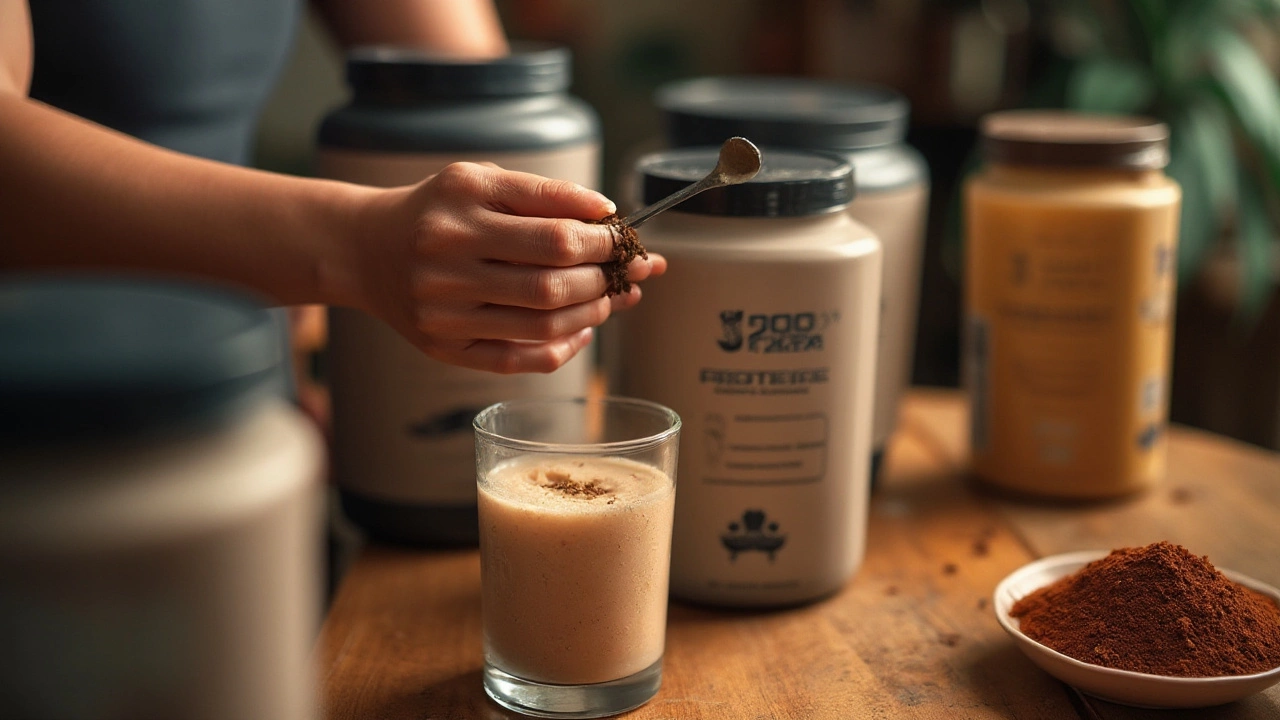
Deciding whether to include protein shakes in your weight loss plan might seem confusing, but many people find them to be a practical option. These shakes can conveniently supplement your diet, especially when you're busy or need extra protein.
It's essential to understand how protein aids in weight management. Protein plays a critical role in repairing tissues, building muscles, and aiding metabolic functions, which can support a healthy weight loss process.
Before you start adding these shakes to your daily routine, it's helpful to know how to choose the right one for your goals, and how to use it effectively without hindering your efforts. Let's delve into what protein shakes truly offer and debunk some common myths along the way.
When embarking on a weight loss journey, understanding the function of protein is vital, as it plays several key roles in the body. Protein is essential for building and repairing tissues, which helps maintain muscle mass even as the scale starts tipping downward. This preservation of muscle is crucial because muscle tissue burns more calories than fat, even when at rest. This means that by consuming adequate amounts of protein, you can potentially boost your metabolism and support a more efficient weight loss process.
Moreover, protein has the unique ability to promote satiety, which is the feeling of fullness after eating. This is because it influences the release of several satiety hormones, helping reduce hunger and curb cravings for unhealthy snacks. In this way, having a diet rich in protein can naturally lead to fewer calories consumed throughout the day, making it easier to stick to your weight management goals. Because of this, protein shakes are often positioned as helpful in a weight loss regimen, offering a quick, nutritious, and satisfying snack or meal replacement.
Interestingly, the thermic effect of food, which refers to the amount of energy needed to digest, absorb, and metabolize nutrients, is higher for protein than for fats or carbohydrates. About 20-30% of the calories from protein are used during digestion, which provides a slight boost to calorie burning, although it should be noted that this alone won’t lead to significant weight loss. A well-known study in the American Journal of Clinical Nutrition highlights that increasing dietary protein from 15% to 30% of total calories can benefit a weight maintenance strategy following weight loss.
"Protein's role in weight management is not limited to muscle preservation but extends to enhancing metabolic rate and controlling hunger hormones," says Dr. John Williams, a nutrition expert.
However important protein is, balance is key. Despite its benefits, consuming too much protein can sometimes add extra calories, potentially stalling weight loss. Therefore, integrating protein in moderation, through foods like lean meats, lentils, and nuts, alongside protein shakes, is recommended. By doing so, you can ensure a balanced intake that supports not just weight loss, but overall health.
Remember, the type and source of protein matter, so choosing quality over quantity is often a wise approach. Be mindful of the protein content in foods and shakes, and how they fit into your daily nutritional needs to support your journey towards a healthier weight.
Protein shakes can be a game-changer for those navigating the world of weight loss. These nutrient-rich beverages offer a practical and versatile option for individuals seeking to control their calorie intake while still ensuring they get the essential nutrients their bodies crave. For starters, by providing a concentrated dose of protein, these shakes can help you feel fuller for longer periods. This satiety effect is crucial when trying to manage hunger pangs and avoid unnecessary snacking, which can be a common pitfall on the journey to achieving desired weight goals.
Moreover, protein is not just about silencing the growl of an empty stomach. It plays a vital role in muscle maintenance and growth. When attempting to lose weight, you aim to drop fat, not muscle. Increasing your protein intake via shakes can foster muscle preservation during calorie-restricted diets. This, in turn, can help keep your metabolism more robust, as muscle tissue tends to burn more calories even when at rest. It's interesting to note how frequently people overlook the importance of a healthy metabolism in shedding unwanted pounds.
For those who are physically active, consuming a convenient protein shake post-workout can help replenish the nutrients lost during exercise. This helps in not only reducing muscle soreness but also speeding up recovery times. Enhanced recovery allows for more frequent and efficient exercise routines, directly supporting your weight loss ambitions. According to a study published in the Journal of the International Society of Sports Nutrition: "Adding high-quality protein to your diet post-exercise can be particularly beneficial for improving the body's nourishment following rigorous activity."
In addition to these advantages, the versatility of protein shakes cannot be overstated. They come in multiple flavors and can be easily customized with various additives like fruits, nuts, or even greens. This level of customization ensures that you don’t suffer from flavor fatigue, and each shake can be tailored to meet your specific dietary needs. Not only is it convenient to make, but these shakes also often contain fewer calories compared to full meals, making them an ideal substitute when you're short on time but still want to maintain your nutritional discipline. Nutrition should be about balance and sustaining energy, something these drinks can wonderfully aid.
"For many, the ease and adaptability of protein shakes can redefine their relationship with dieting,” says nutritionist Clara Roe from the Global Center for Nutritional Health.
Beyond the physical benefits, incorporating protein shakes into your diet can foster a sense of control and structure. Consistency can often be a key player in any successful diet plan. The predictable nature of shakes helps you plan and prep meals with little fuss, and when you're juggling responsibilities, this reliability can be crucial. It's also worth noting that consistent protein intake aligns with macronutrient goals set by many dietitians, ensuring balance without having to second guess your meals. Hence, as you embark on this weight management journey, having protein shakes by your side could be both a personal and practical ally.

Picking the right protein shakes can significantly impact your weight loss journey. With so many options available, it's not uncommon to feel overwhelmed as you try to make the best choice. It's crucial to be informed about what you're consuming, so let's break down some of the common types of protein shakes and what to look for when selecting one. First and foremost, consider your dietary needs and preferences. Many protein powders are derived from dairy, like whey or casein, but there are plant-based options too, such as pea, soy, or brown rice protein. Plant-based options are often suitable for those with lactose intolerance or individuals following a vegan diet. Pay attention to any allergies or intolerances you may have, as this will narrow down your choices considerably.
Next, let's talk about the ingredients. When checking the label, keep it simple. Ideally, a protein shake should contain a minimal list of ingredients. Watch out for added sugars, artificial flavors, and unnecessary fillers, as these can contribute to added calories you don’t need when trying to lose weight. A good protein shake will balance high protein content with lower carbs and fats, making it a viable option for maintaining muscle mass while shedding pounds. It's important to look at the protein content per serving. Most adults need a daily protein intake that provides around 56 grams for men and 46 grams for women, according to the Institute of Medicine's guidelines.
Consider your lifestyle and how the shake fits into it. If you're on-the-go a lot, pre-mixed shakes can be a time saver, although powders tend to offer more flexibility in customizing your serving size and can be more cost-effective in the long run. Some people might focus on nutrition bars for meal replacements; however, protein shakes offer hydration in addition to nourishment, which is an added benefit. For those looking to trim down, protein shakes should complement a balanced diet, not replace real, whole foods. Dr. Lisa Young, a prominent nutritionist, advises,
"A protein shake can be a healthy, filling snack to replace chips or cookies, but should never replace whole meals regularly. The real trick is finding that perfect balance for yourself."Explore flavors that suit your palate. If you find something enjoyable, you're more likely to stick to your plan. Yet, keep in mind that flavors often mean added sugars or sweeteners, so be discerning in your choices. Feel free to get experimental by adding fresh fruits or veggies to your shakes, transforming them into a refreshing smoothie packed with fiber and antioxidants. Remember, in the end, the right choice aligns with your personal health and fitness goals, making your weight management journey all the more enjoyable.
When it comes to protein shakes and weight loss, there are several myths that have emerged over time. One major misunderstanding is the belief that merely drinking these shakes will result in significant weight loss without any changes to your diet or exercise routine. While protein shakes can indeed contribute to a balanced diet, they are not miracle solutions that will melt away fat effortlessly. They should ideally be part of a multifaceted approach that includes regular physical activity and a well-rounded nutritional plan. People often find themselves discouraged when expectations don't align with outcomes, but understanding this can lead to more realistic and achievable goals.
Another misconception involves the timing and frequency of consumption. Many think it's necessary to consume a protein shake immediately after every workout or multiple times a day to see results. While there's some evidence suggesting benefits to post-workout protein consumption in terms of muscle recovery, it doesn't mean you have to rush to blend a shake right after exercising. Your body's needs are personal and specific, influenced by your current dietary habits, the intensity of workouts, and overarching fitness goals. Consuming protein shakes frequently without understanding your personal needs might lead to unnecessary caloric intake.
There are also those who worry that protein shakes might lead to bulking up excessively. This misconception likely arises from the association of protein with bodybuilding, but it's important to note that building substantial muscle mass involves a focused training regime, significant intake of additional calories, and often long-term dedication. For those simply looking to lose weight or maintain muscle mass during calorie restrictions, protein shakes can help prevent muscle loss, not necessarily promote abnormal growth. Remember, moderation and balance are key.
"Protein powder works if you need it," a dietitian from the reputed Mayo Clinic affirms, "but for most people, prioritizing whole foods will offer well-rounded nutrients."
Finally, the idea that all protein shakes are created equal is another prevailing myth. There's a wide array of products available, and their components can vary significantly. Paying attention to the details, like sugar content, artificial additives, and the source of the protein itself can have a substantial impact on health outcomes. Shake brands marketed as weight-loss products often contain extra ingredients that might not align with a healthy diet aimed at weight management. It’s a good practice to thoroughly read labels and research reputable brands when choosing the right protein shake.

When incorporating protein shakes into your weight loss journey, how they are used can make a world of difference. One crucial aspect to consider is the timing of your shakes. Consuming protein shakes post-workout can help rebuild muscle fibers and support muscle recovery. This doesn’t just aid in weight management but also enhances strength over time. Integrating them in place of a meal might be beneficial sometimes but be cautious not to rely on them solely. Replacing too many meals with shakes can lead to nutritional deficiencies, so it's vital to maintain a balanced diet.
Another key factor is portion control and understanding the calorie content of your chosen shake. Many people underestimate the caloric contribution of a healthy diet drink. Always check the nutritional label, ensuring the shake suits your daily calorie budget. For those specifically aiming for weight loss, selecting shakes that are lower in calories but high in proteins can be more effective. Customizing shakes with added fruits or oats can enhance flavor and nutritional value without adding unhealthy sugars.
It's also valuable to remember the quality of protein sourced. Opting for shakes with complete proteins, such as whey or soy, ensures you're getting all essential amino acids. These proteins not only promote satiety, helping you feel fuller for longer, but they also support various bodily functions, crucial for healthy weight loss. Remember always to hydrate well, as protein metabolism demands adequate water intake. This can enhance the metabolic rate and improve digestion while ensuring you're getting the full benefits of the shakes.
Listening to your body is just as important as monitoring nutrient intake. Adjust the frequency and timing of your protein shakes based on how your body responds. Everyone's nutritional needs can differ, and experimenting to find what works best for you may take time. Taking advice from healthcare professionals or nutritionists can help tailor your use of protein shakes. As a nutritionist from The Dieticians of Australia once suggested,
"Protein should supplement your day, complement your meals, not replace them entirely."This perspective helps to emphasize a balanced approach to these shakes.